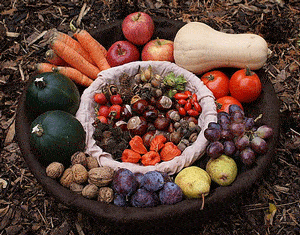
Organic and other agro-ecological farming systems can help the world feed itself, but as well as changing our farming systems, we need to eat differently, feed our livestock differently, and waste less food.
There is already enough food produced today for everyone to have the nourishment they need, and yet nearly 1 billion people are hungry, and 1 billion malnourished with another 1 billion people overweight, leading to major diet related health problems, and this number is growing.
The majority of people who are hungry live in the Global South, in poor rural areas, although hunger amongst the urban poor is growing. A growing number of international experts agree that agroecological systems such as organic are best suited to meet the needs of the poorest people, while reversing environmental degradation.
It is predicted that there will be 9 billion people in the world by 2050. This has lead some to argue that a 70% increase in food production will be needed. But this assumes the spread of a Western diet, involving much higher consumption of meat and dairy products, to people in the Global South, while also assuming there will be no reduction in the amount eaten in the Global North.
A different system
Right now 35–40% of all cereals produced worldwide are fed to livestock, and this could rise to 50% by 2050 if meat consumption continues to rise as predicted. If all cereals were fed to people not animals, we could feed an extra 3.5 billion people. If meat and dairy consumption were held at the levels we reached in 2000, 400 million tonnes of cereals would be freed for human consumption, enough to feed an additional 1.2 billion people in 2050. If we switch from meat which is mainly fed on grains, to beef, lamb and mutton from grazing animals eating grass which we cannot eat, this would provide better quality meat and reduce greenhouse gas emissions.
Reducing food waste is also crucial. Globally about one third of food produced for human consumption is lost or wasted, but much more food (about 280–380kg per person per year) is wasted in Europe and North America, compared to 125–165kg in low income countries in the Global South. Food wastage in the Global South is mainly caused by financial and technical limitations in harvesting, storage, infrastructure and packaging; reducing this wastage would have a significant impact.
Scientists have modeled how we can feed 9 billion people in 2050 with a healthy diet in an environmentally sustainable way. French researchers assumed 3,000 kcal per person per day, with 500 kcal from animals, a decrease for higher income consumers, but an increase in Asia and sub-Saharan Africa. Waste reduction would reduce food demand by 25% in richer countries. Worldwide, people would eat more diverse and healthy diets, with a 25% decline in demand compared to the business as usual scenario. A similar scientific study in Germany and Austria found that organic agriculture can probably feed the world population of 9.2 billion in 2050 if relatively modest diets are adopted, with a low level of inequality in food distribution required to avoid malnutrition. These scenarios assume that in countries like the UK, we will both produce food differently and eat differently, as it is clear for health and environmental reasons that diets must change.

